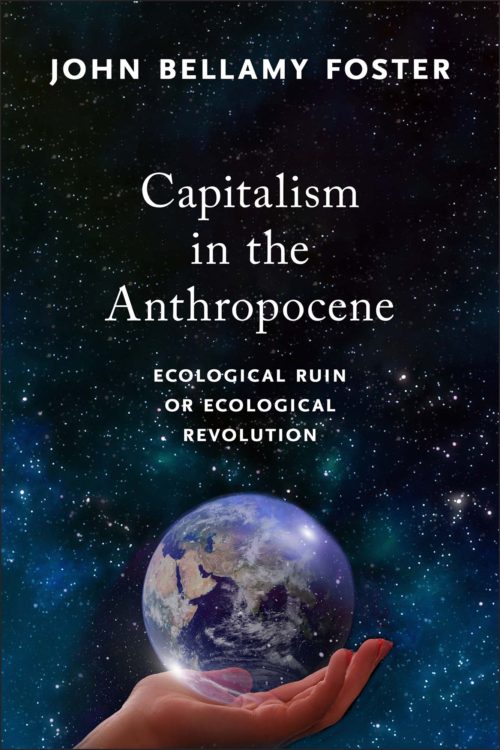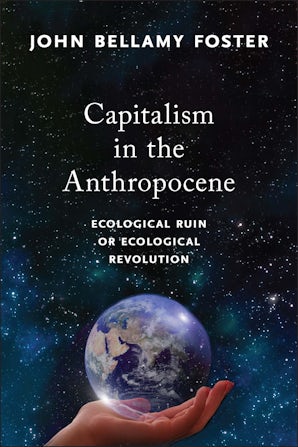“Stimulating…much to grapple with” (Capitalism in the Anthropocene reviewed in ‘The Resolute Reader’)

Capitalism in the Anthropocene:
Ecological Ruin or Ecological Revolution
By John Bellamy Foster
$29 / 576 pages / 978-1-58367-9746
Reviewed by The Resolute Reader
Over the last quarter of a century, John Bellamy Foster’s work on ecological Marxism has been hugely influential on the international left. His book Marx’s Ecology, published in 2000, was incredibly timely. Coming as the world was increasingly aware of the environmental crises that people faced and offering new insights into how Marx and Marxists have understood nature and the way human society changes the world that we are part of.
As editor of the US socialist magazine Monthly Review Foster continues a prodigious output of articles that grapple with many different topics, but his work on the environment and ecology continues to develop. This new book brings together and updates many of Foster’s articles from various different sources, with a particular focus on the way that capitalism transforms nature. Even those who regularly read Foster’s articles in Monthly Review will find new material here as it includes articles from a wide variety of popular and academic journals and all of them have been brought up to date.
Foster’s argument can be summed up with quote from the introduction where he explains the peculiar relationship that capitalism has to nature. Quoting Karl Marx, Foster writes:
Nature in this system is viewed simply as a ‘free gift’ to capital, while the vast majority of human beings are treated as an exploitable and expendable mass from which to generate surplus for the wealthy owners. The result is a system that knows no bounds, is oblivious to genuinely human needs, and is inherently unsustainable – now confronting its absolute limits in the Anthropocene.
Many of the chapters explore how exactly this process takes place. Foster looks at the growth imperative within capitalism, that drives accumulation and systematically degrades nature. He engages with contemporary debates about how this system can be challenged, including the degrowth movement. He notes, for instance, while discussing Naomi Klein’s work that many critics of the left willingly confuse matters by arguing that degrowth is similar to “the austerity policies associated with neoliberalism” rather than a transformative project that fights for an economy based on “rational use of resources under conditions of absolute necessity and the promotion of equality and community”.
As most of these chapters first appeared as articles over a number of years the reader will not a development of Foster’s arguments through the book. This is frequently in response to evolving social movements. Foster notes, for instance, that “main thrust” of the environmental movement has changed. shifting “from demand-side initiatives aimed at reducing consumer-market demand for carbon fuels to supply-side strategies aimed at corporations and designed to keep fossil fuels in the ground”.
Some chapters however explore more theoretical debates. A number of these are more challenging, and require careful reading. There’s an interesting chapter on “the theory of unequal ecological exchange” which explores how Howard Odum’s ideas of “emergy” might be synthesised with Marx’s own dialectical understanding of society and nature to produce a clearer understanding of how the inequalities of global capitalism had led to an “unequal ecological exchange between center and periphery”. There are some useful concepts here, but Foster cautions us that “learning from such a systems ecology approach is one thing; falling prey to the reductionism to which it can potentially lead is another. In any Marxian analysis, ecological materialism must take theoretical precedence over energetics”.
Other articles deal with Engels and dialectics and several are defences of Foster works from his critics, particular those on the left who critique the “metabolic rift” theory that Foster develops from Marx’s work. I have discussed some of this elsewhere and won’t revisit that in this review. Instead I want to finish with a look at Foster’s discussion of the struggle for a sustainable world.
What sort of society might this be? Foster argues that a sustainable society is one where there is a rational organisation of the interaction, the metabolism between society and nature. This would be a society organised by the “associated producers” whose aim would be to pass on the world to succeeding generations. This, he notes, contrasts with reformist strategies – even radical ones – where there is no fundamental transformation in economic organisation. For instance,
rather than dealing with the unemployment problem directly – through a radical program that would give people jobs aimed at he creation of genuine use values in ways compatible with a more sustainable society – degrowth theorists prefer to emphasize sorter working hours.
But, he continues, “it is hard to see the viability of shorter work hours and basic income guarantees on the scale suggested other than as elements in a transition to a post-capitalist (indeed socialist) society.”
In fact one of the themes that runs though Foster work in this collection is a sense of urgency at the need for fundamental social transformation in the face of ecological collapse. As such, Foster argues that radical demands can only be successful as part of a wider struggle for systemic change. How does Foster envision social transformation? He writes:
Here it is important to recognize that an ecological and social revolution under present historical conditions is likely to pass through two stages that we can call ecodemocratic and ecosocialist. The self-mobilisation of the population will initially take an ecodemocratic form, emphasizing the building of energy alternatives combined with just transition, but in a context generally lacking any systematic critique of production or consumption. Eventually, the pressure of climate change and the struggle for social and ecological justice, spurred on by the mobilisation of diverse communities, can be expected to lead to a more comprehensive ecorevolutionary view, penetrating the veil of the received ideology.
It is not immediately clear to me whether Foster’s description here is intended to refer to the period after workers’ have won state power and overthrown capitalism, or if it is intended to mean the whole period of revolutionary transition. A few paragraphs later he says, “The path toward ecological and social freedom requires abandoning a mode of production rooted in the exploitation of human labour and the expropriation of nature and peoples.” In this case, we must understand Foster’s earlier vision as being post-revolution, in the sense of taking place after the defeat of capitalism yet while the earlier social and economic relations continue to exist.
Foster explains that “in general we can expect the Global South to be the site of the most rapid growth of an environmental proletariat, arising from the degradation of material conditions of the population in ways hat are equally ecological and economic”.
As I have written previously I am wary of the phrase “environmental proletariat” as it might be interpreted as downplaying the historical role of the working class as producers of surplus value under capitalism. But I am not sure that Foster means it quite in this sense, as he explains the term as referring to a “broad mass” of the population who gain awareness of the environmental threat leading them to revolutionary action. Having said that I do think Marxists need to insist on the centrality of the working class to revolutionary struggle. They are a class defined by their lack of ownership of the means of production and their need to sell their labour power. The working class is the class upon whom capitalist society depends, who have the power to stop the capitalist economy and through their revolutionary organisation build a socialist society.
Of course their position in society will not lead workers directly to an ecological consciousness, but this is why campaigns by environmentalists remain so important – as they can bring ecological issues into the working class movement. On a small scale the presence of environmental activists, often encouraged by socialists, on picket lines in the current mini-strike wave in Britain, is a good example of this process. In this sense Foster’s term “environmental proletariat” is a helpful concept.
As with all of his work, John Bellamy Foster’s Capitalism in the Anthropocene is enormously stimulating. The book covers many different subjects and readers will find much to grapple with. Foster’s theoretical work has been crucial to a new generation of activists, socialists and Marxists trying to get to grips with the multifaceted capitalist crisis we all face. The strength of Foster’s work is that it gives a clear theoretical base to the revolutionary struggles that we are engaged in. As such this, and Foster’s earlier books, are a crucial tool for the fight for socialism.
Read this review at The Resolute Reader


